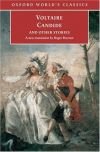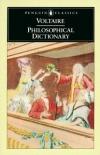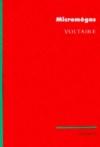
Candide on Voltairen tunnetuimpia teoksia. Se kuvaa aikansa yhteiskuntaa satiiriseen tyyliin. Ranskankielinen alkuteos Candide ilmestyi vuonna 1759. J. A. Hollon suomennos ilmestyi vuonna 1953. Teoksessa optimistinen Candide seikkailee ystäviensä kanssa ympäri maailmaa ja kokee matkallaan tuon ajan yhteiskunnan …

Candide on Voltairen tunnetuimpia teoksia. Se kuvaa aikansa yhteiskuntaa satiiriseen tyyliin. Ranskankielinen alkuteos Candide ilmestyi vuonna 1759. J. A. Hollon suomennos ilmestyi vuonna 1953. Teoksessa optimistinen Candide seikkailee ystäviensä kanssa ympäri maailmaa ja kokee matkallaan tuon ajan yhteiskunnan …

The Dictionnaire philosophique is an encyclopedic dictionary published by Voltaire in 1764. The alphabetically arranged articles often criticize the Roman Catholic Church and other institutions. The first edition, released in June 1764, went by the name of Dictionnaire philosophique portatif. It was 344 pages and …

Candide on Voltairen tunnetuimpia teoksia. Se kuvaa aikansa yhteiskuntaa satiiriseen tyyliin. Ranskankielinen alkuteos Candide ilmestyi vuonna 1759. J. A. Hollon suomennos ilmestyi vuonna 1953. Teoksessa optimistinen Candide seikkailee ystäviensä kanssa ympäri maailmaa ja kokee matkallaan tuon ajan yhteiskunnan …

Zadig ou la Destinée is a famous novel and work of philosophical fiction written by Enlightenment philosopher Voltaire. It tells the story of Zadig, a philosopher in ancient Babylonia. The author does not attempt any historical accuracy, and some of the problems Zadig faces are thinly disguised references to social …

Lettres philosophiques is a series of essays written by Voltaire based on his experiences living in England between 1726 and 1729. It was published first in English in 1733 and then in French the following year, where it was seen as an attack on the French system of government and was rapidly suppressed. Most modern …

L'Ingénu is a satirical novella by the French writer Voltaire, published in 1767. It tells the story of a Huron called "Child of Nature" who, after having crossed the Atlantic to England, crosses into Brittany, France in the 1690s. Upon arrival, a prior notices depictions of his brother and sister-in-law, whom they …

 English
English Español
Español Deutsch
Deutsch


